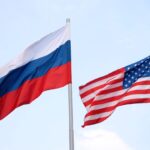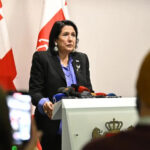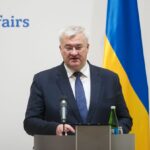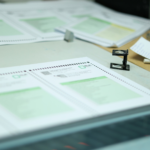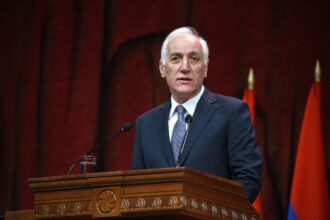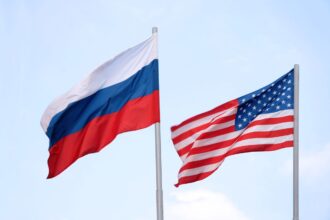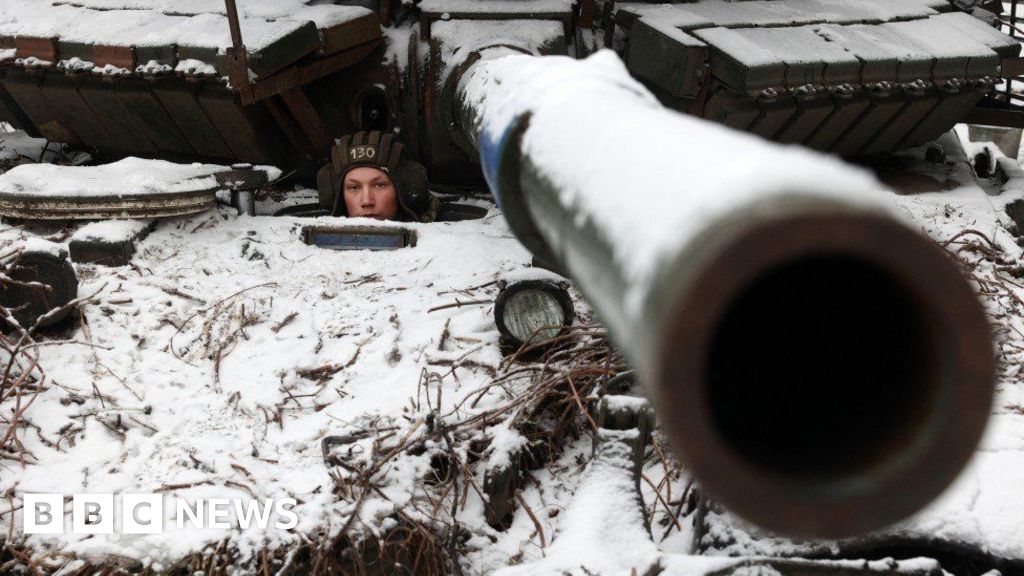Inna sweeps up the broken glass outside her store, knowing that her country’s fate is in the hands if Americans who vote more than 5,000 miles from her shop.
“We hope that Kamala Harris will win and support us,” says she.
A Russian bomb shattered the shop windows of her store – this is a common event in Zaporizhzhia. There is a 10-metre-wide crater on the road.
“Of Course we are concerned about the outcome [of this election],” she continues. “We want the enemy to be defeated!”
Ukraine needs the US’s help to even have a chance at achieving this.
In 2023, Ukraine launched a counteroffensive on this southern-eastern front line in the hope of forcing out the Russian invaders.
Ukraine’s ambitions are now centered on survival, as it has made little or no progress. Missiles and glide-bombs are launched daily into Ukrainian towns and cities, and its soldiers endure constant Russian attacks.
While Democratic Vice President Kamala Harris said that military aid would continue in the event of her victory, a Republican-controlled Congress could limit her powers. The pipeline of military aid, which has so far totaled more than $50bn is less likely to continue under a second term by Donald Trump.
Whoever becomes the new US president will have an impact on Ukraine’s border and all those who live within it.
If, for instance, they forced Ukraine, to give up land, and frozen the front lines, then Zaporizhzhia, could be suddenly divided, like North and South Korea, after the ceasefire in the 1950s that stopped the fighting, but never officially ended it.
Trump said he’d “work out something” in order to end the war, and suggested that Ukraine might have to give up land.
The second option for the US would be to withdraw its support completely. This would mean that over time, Russian forces could engulf even more of Ukraine and the entire region.
The third scenario, where Ukraine liberates its occupied territory completely, is becoming less and less probable.
This lack of progress on the battlefield has led to a growing debate in the US about the merits of supporting Ukrainian soldiers like Andriy.
He is in charge of the fleet of US-made armored vehicles that his unit uses on the frontlines. When they are not being used to move soldiers, they are parked under camouflage nets along tree lines.
He explains that if aid is stopped or slowed, the infantry will be left to carry the burden. “We will fight with what we’ve got, but everyone knows Ukraine cannot do it alone.”
Andriy, along with his Ukrainian colleagues, are anxiously awaiting the US election on 5 November. The uncertainty is stifling military ambitions and frustrating efforts to secure additional help.
Western allies often follow the example of America when deciding whether or not to support Kyiv in its war effort.
Andriy: “It’s frustrating and upsetting to hear that one candidate who is less willing than us to help us is leading the polls.” “But we are not going anywhere.”
The soldiers, who are surrounded by autumnal farmland and grenade launchers, mounted machine guns, and drones, are eager to show off the American equipment they use.
All of them, they say, are far superior to the Soviet-era alternatives.
Zelensky also tries to sell his country to his allies as an investment opportunity, whether it’s through its natural resources or business ventures.
Serhiy, a drone pilot, explains to us how we can directly give feedback to Western manufacturers.
“We have a chat online with them and we make suggestions,” says he with a smile. “Improvements have already been made.”
The war in Ukraine has forced innovations at home, as demonstrated by drone manufacturing. It also allows Western companies to test products in a war zone.
Western aid in the billions of dollars has also influenced reforms within certain areas of government. Kyiv wants the world to know it’s worth backing.
The question is if these advances will be overshadowed by a conflict that is increasingly going Russia’s direction.
We meet someone who has experienced Russian brutality.
When the full-scale invasion began, Lyubov’s daughter and her grandchildren fled to the US.
Last time we met, her village of Komyshuvakha was destroyed by the invading forces two years ago.
She seemed happier this time, despite having lived so close to the battle for so long. In the warmth of her new apartment, I asked her if Ukraine should negotiate an end to the war.
She replies, “What about the people who gave their life?” “I will see the end of this war when we reach our 1991 borders, when Crimea and Luhansk were ours.”
The US election is covered in almost constant detail on Ukrainian news programs, with war predictions based on who might win.
Journalists are fighting Russian disinformation against Kamala Harris, who is undoubtedly Ukraine’s favorite candidate.
We find that in the south and east of Ukraine, a growing number are calling for an end to the war and believe that a Donald Trump administration is the best hope of bringing relief.
We spoke with many of these people in the eastern town of Pokrovsk where Russian forces are advancing.
There is a feeling that Ukraine should have started negotiating at the beginning of its full-scale invasion to prevent the death, destruction and violence they’ve seen.
Both sides held talks in the early months of 2022. Evidence of alleged Russian crimes against Ukraine halted diplomacy efforts and strengthened Ukraine’s resolve.
One woman said, “Death does not justify territory.” “We must stop this war and Trump is the only person who can do that.”
Some people are tired of the Russian aggression after 11 years.
It is not a sentiment that is openly shared by the politicians of Ukraine’s Parliament. While there is still a cross-party commitment to continue fighting, President Zelensky’s “victory” plan has been criticized for not having a more defined timeline.
Lyubov was not going to express her opinion on who should be the next president:
“I would love to see a true friend to Ukraine win, someone who will continue to be our supporter.” But I can’t tell you who it will be.”
As much as I admire Lyubov’s inner steel, her words reflect a growing and uncomfortable contradiction. She wants to see Russia defeated, but also wants the bloodshed stopped as soon as possible.
Ukraine is watching and feeling the pendulum swing between US interventionism, and isolationism.
Since 1991, when the Soviet Union collapsed, Ukraine has been fighting for its independence.
It has found itself on the edge a geopolitical plate, trying to align with the West while Russia pulls the other way.
Ukraine needs America’s help to stop it being torn asunder by the full-scale Russian invasion.
Hanna Chornous and Sara Monetta contributed to this report.
BBC correspondents are investigating the impact of the US election results on their localities and what people think about the White House race around the world.
Read More @ www.bbc.com

